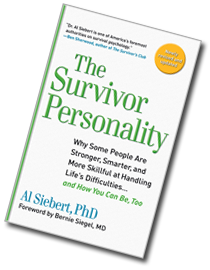Listening to Survivors of Extreme Experiences
Guidelines for Friends and Family
by Al Siebert, Ph.D., author of The Survivor Personality
"Sorrows are halved and joys are doubled when shared with a friend."
More than once after a survivor has talked with me, the person's family has said, "What did he tell you? He's never talked to us about it." The following guidelines show how to be a good friend and a good listener with people who have survived distressing experiences.
Emotional recovery takes time. A person's healing process will be helped or hampered depending on the emotional maturity and listening skills of friends and family. The following guidelines show how to listen well.
- Don't ask a person to open up unless you can handle honest answers. when vietnam combat veterans returned home they found that very few people had the emotional strength to listen to their stories. don't open someone up and then "chicken out" if they tell you about experiences, memories, or feelings you can't handle. survivors of traumatic experiences will usually talk to a person who has the emotional strength to listen.
- Coach the person to develop a temporary coping plan. Simple everyday activities help stabilize a person experiencing the turmoil of grief and loss.
- Give the person lots of time. When a survivor is willing to talk to you, it is important to allow him or her plenty of time to talk. Don't interrupt to share your feelings about your experiences. Plan to listen for hours. Expect some follow-up sessions. When people open themselves up to experience and express strong emotional experiences additional details and feelings may flood into their minds in the days that follow. It is typical for survivors to have weeks and months of emotional turmoil. Encourage the person to write about their feelings in a personal journal.
- Be an active listener. Ask about feelings. Ask for details. Ask questions when you feel puzzled about facts or incidents.
- Remain quiet if he or she starts crying. Don't tell people to not feel what they are feeling. It may help to touch or hold the person if it feels right to both of you. Don't suggest a better way to look at it. Leave his or her thoughts and feelings alone. Your quiet presence is more useful than anything else you can do. Let nature do the work.
- Listen with empathy but minimize sympathy. It is easier for survivors to express their feelings if they don't have to put up with sympathy statements such as "What a horrible experience!" or "You poor soul!" Survivors of distressing experiences talk more easily to a person with calm concern. Control your imagination and resist letting the person's feelings become your feelings. Don't make the survivor have to handle your emotional reactions as well as his or her own. If you need emotional support, seek it elsewhere.
- Ask if he or she sees anything positive in the situation. This is the basis for what Victor Frankl called logotherapy. Do not assume that a survivor will be experiencing deep grief or that they are suppressing it if they don't seem to feel it. Some resilient people quickly reach emotional peace with their loss. (Note: Resist trying to rescue people in a victim pattern. This is their practiced way of handling life's adversities. Relax and let them do it their way.)
- Later on, inquire to see if the survivor is finding any value in the experience. Many people are made stronger by distressing experiences. Spiritual growth is often prompted by emotional pain. The same extreme distresses that cause emotional trauma for some people lead to others becoming stronger. Gently inquire to see if the person is discovering new inner strengths and new life purpose.
© 2003, Al Siebert, Ph.D.
Al Siebert studied mental health for over forty years. He is author of The Survivor Personality: Why Some People Are Stronger, Smarter, and More Skillful at Handling Life's Difficulties...and How You Can Be, Too.
